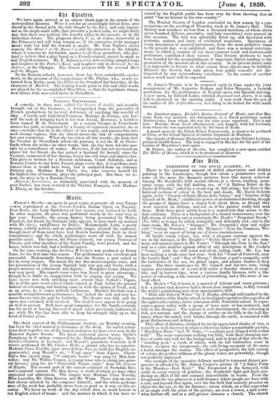PARISIAN THEATRICALS.
A comedy, in three acts, called Une Preure d'AmitM, and recently brought out at the Gymnase, is distinguished from the generality of French productions by its total deficiency of anything like novelty of idea. A lovely and high-bred Countess, Madame de Cernay, sets her- self the task of bringing back to her dear friend, Hortense, a faithless lover named M. de Pierrefonds. As a certain Vicomte de Pierrefonds crosses her path, accompanied by a beauty of equivocal character, she at once concludes that he is the object of her search, and pursues him into such strange regions, that she almost incurs the risk of compromising her own reputation. When she has taken all this trouble, she finds that the Vicomte de Pierrefonds whom she pursues, is not the M. de Pierre- fonds whom she seeks—in other words, that she has been led into mis- take by a coincidence of names. However, if she has not recovered an adorer for her friend, she has gained a husband for herself, since the Vicomte, enamoured of her charms, leaves his evil ways and marries her. This piece is written by a Russian nobleman, Count Sollohub, and as Russian Counts do not write French plays every day, it is perhaps more famous than it would have been, had it emanated from an ordinary Parisian pen. Madame Rose Cheri, too, who reserves herself for the highest line of business, plays the principal part. But then, we re- peat, the piece is by a Russian Count. Adrienne Lecourreur, so intimately associated with the memory of poor Rachel, has been revived at the Theatre Francais, with Madame A. Plessy, as the heroine.


























 Previous page
Previous page